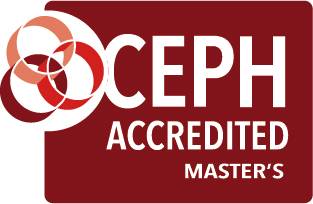Accreditation
GVSU's Master of Public Health is CEPH Accredited
The Grand Valley State University's Master of Public Health (MPH) program is fully accredited by the Council on Education for Public Health (CEPH) as a Public Health Program.
Our MPH program initially received CEPH accreditation in June 2016. The current accreditation term extends until December 31, 2031, pending the program's continued documentation of compliance through interim reporting, annual reporting, and any other reporting required by the Council.
CEPH accreditation serves multiple purposes. In general, accreditation attests to the quality of an educational program that prepares for entry into a recognized profession.
- For the public, CEPH accreditation promotes the health, safety and welfare of a society by assuring competent public health professionals.
- For prospective students, CEPH accreditation provides assurance that the program has been evaluated and met accepted standards established by and with the public health profession.
- For employers, CEPH accreditation provides assurance that the curriculum covers essential skills and knowledge needed for today's jobs.
- For graduates, CEPH accreditation promotes professional mobility and enhances employment opportunities in positions that base eligibility upon graduation from an accredited program.
CEPH Accredited
Council on Education for Public Health (CEPH)
800 I Street NW, Suite 4008
Washington, DC 20001
www.ceph.org
The Council on Education for Public Health
CEPH is an independent agency recognized by the U.S. Department of Education to accredit schools of public health and graduate public health programs outside schools of public health. Their mission is to assure quality in public health education and training to achieve excellence in practice, research and service, through collaboration with organizational and community partners. The Council’s focus is the improvement of health through the assurance of professional personnel who are able to identify, prevent and solve community health problems.
The Council’s objectives are:
- to promote quality in public health education through a continuing process of self-evaluation by the schools and programs that seek accreditation;
- to assure the public that institutions offering graduate instruction in public health have been evaluated and judged to meet standards essential for the conduct of such educational programs; and
- to encourage - through periodic review, consultation, research, publications, and other means - improvements in the quality of education for public health.
CEPH protects the interests of students and the public by supporting the development of successful public health schools and programs, valuing:
- quality and innovation in process and outcomes;
- consistency, fairness and transparency; and
- collaboration and inclusion to support positive environments in the CEPH organization and those they accredit
Learn more about the Council on Education for Public Health.
~adapted from https://ceph.org/about/org-info
Why get a degree from a CEPH accredited program?
In general, there are two major practical implications for students receiving a public health graduate degree from a non-accredited institution:
- Some employment is only open to graduates of CEPH-accredited units. The U.S. Public Health Service, some U.S. military public health jobs and some state and local government agencies require that MPH-level jobs be filled with graduates of CEPH-accredited schools and programs. Other employers may express a preference for graduates of CEPH-accredited units. If you have an idea of the area or agency where you would like to work after graduation, you should speak to a human resources officer with specific questions. CEPH is not involved in defining the specific qualifications for employment with any given agency.
- Attendance at a CEPH-accredited unit provides a pathway to eligibility to sit for the Certified in Public Health exam and obtain the CPH credential. The exam and credential are administered by the National Board of Public Health Examiners (NBPHE). NBPHE has also defined other pathways to eligibility that are based on public health work experience. NBPHE is not affiliated with CEPH, and CEPH does not have a formal role in shaping the eligibility or other rules. Visit https://www.nbphe.org/ for additional information.
Attending a CEPH-accredited unit means that you know that your degree program has completed a multi-level review and was found to meet the nationally-agreed-upon standards developed by public health academics and practitioners.
~adapted from CEPH: https://ceph.org/constituents/students/faqs/#2


